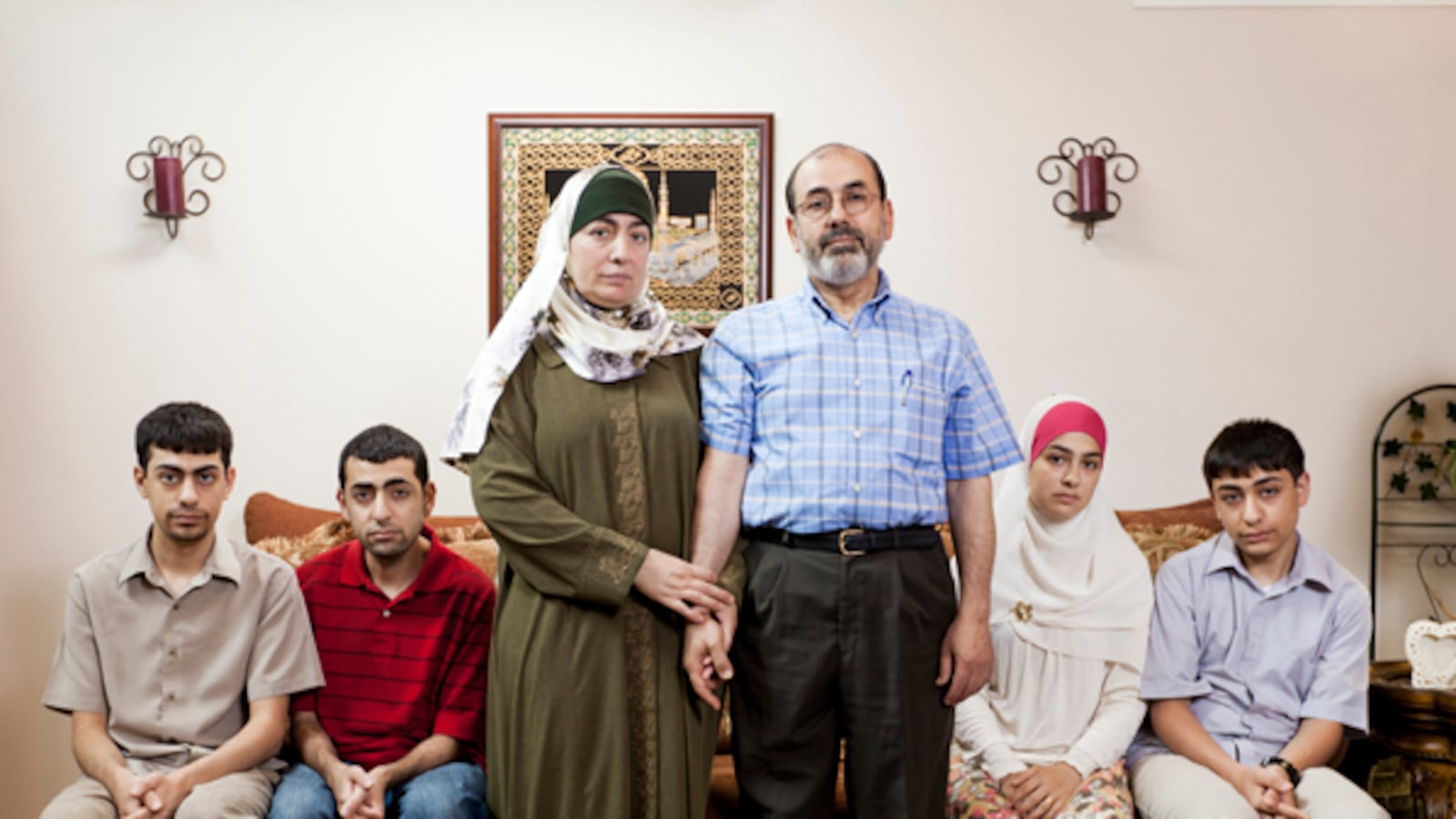In the past, sharing food has always seemed like the answer to Shakir Hamoodi. Born in Iraq, but trained as a nuclear engineer in a U.S., he has used food to bridge cultural differences since 2004, leaving a research job at the University of Missouri to open “World Harvest,” an international gourmet-food market in Columbia, a college town of 100,000. With its containers of freshly ground cumin and selection of artisanal cheeses, the place is holy ground for the culture-hungry academic community where Hamoodi, who became a citizen in 2002, has for decades lived with his wife and five children in a large, elegant home.
It might be argued, in fact, that the idea of sharing food was what led to the decision that may well destroy his life: from the early 1990s to 2003, as he was rising to become the most influential member of Columbia’s small Muslim community and a local symbol of religious coexistence, he also funneled more than $200,000 to family and friends in Iraq in violation of the U.S. sanctions. The cash, which included money given to him by other Iraqis in Columbia for distribution to their families, was sent to an account in Jordan to evade detection. It was doled out mostly in dribs and drabs, even the authorities concede; $40 a month to the son of a friend trying to eat while attending medical school, $80 to Hamoodi’s blind mother. There was no suggestion that Hamoodi, who was an outspoken critic of the war in Iraq and for years taught classes about Islam at the local community college, aided terrorists, or that the money wound up in Saddam Hussein’s hands; his elaborate email trail served as receipts, as tidy as his bookkeeping at the store.
“I would get messages from my sisters, I have 11 siblings,” he says, as he shares a somber meal—piquant red peppers from South Africa, French cheeses, crusty baklava—with his wife and sons at the long dining room table. “They would be starving. Starving. So I did what anyone, any American, would do.”
But this time food will not save Shakir Hamoodi. Late last month, six years after FBI first raided his house and three years after his lawyers negotiated a guilty plea, the judge in his case confounded Hamoodi and his legion of supporters in Columbia, sentencing the 59-year-old to three years in federal prison. Hamoodi will start serving his and sentence in August, after the end of Ramadan, his only hope an unlikely commutation from President Obama.
There are no tallies of how many individuals or corporations were prosecuted over the Iraq sanctions, because the Justice Department lumps together sanctions violations from countries around the world, including North Korea and Myanmar. Nor does the department track the severity of sentencing in such cases, according to a spokesman, Dean Boyd.

Of the seven individuals who received prison time on a list compiled for Newsweek by the department, all appear to have been accused by the government of actions that exceeded the scope of humanitarian relief however.
The most high profile of the cases is that of Rhafil Dhafir, a Syracuse oncologist, who in 2005 was sentenced to 22 years after being convicted at trial not only of violating the sanctions, but Medicare fraud, tax evasion and money laundering. (Dhafir, who has repeatedly appealed, remains behind bars). A Washington state resident, Hussain Al-Shafei, received an eight-month term after pleading guilty in 2010 for his part in a scheme that sent $12 million to Iraq. Some of the money was sent to Al-Shafei's brother-in-law to start a construction business, while the rest was collected from other stateside Iraqis to support their families back home. Unlike Hamoodi, however, Al-Shafei charged his friends 4 percent to 6 percent interest on the transfers.
In January, another Columbia resident, Mubarak Hamed, originally from the Sudan, was sentenced to nearly five years for his roll as head of the Islamic American Relief Agency, a nonprofit organization that was on the U.S. terrorism watch list and sent more than $1 million to Iraq and helped Sudanese groups allied with al Qaeda and the Taliban (Hamed pleaded guilty to conspiring to illegally transfer funds to Iraq, as well as to obstruction of justice). A former Michigan congressman, ultraconservative Republican Mark Siljander, was also sent to prison for a year in the plot for having taken money to lobby his former colleagues to remove the organization from the watch list. (Siljander pleaded guilty to obstruction of justice and acting as an unregistered foreign agent).
“Of course, there may have been different circumstances (with Hamoodi), but the fact is that sanctions were in effect and he violated the law,” says Boyd, the Justice Department spokesman. Hamoodi, he adds, could have applied for a license to send humanitarian goods, though not cash, through the Treasury Department’s Office of Foreign Assets, though even those who have supported sanctions have acknowledged that the process was Byzantine in its complexity and capricious in its administration.
Due to the circumstances of the case, the Justice Department in fact recommended that Hamoodi’s term be 48 months, shy of the sentencing guidelines, which call for between 51 and 71 months. The judge, Nanette Laughrey, a Clinton appointee who lives in the same enclave of gracious homes as the Hamoodis, did not respond for comment, but said at the sentencing that Hamoodi’s profile in the community and his cooperation had influenced the decision to reduce the sentence to 36 months. She conceded that other defendants had been given lesser sentences for such crimes, even probations, but that the amount of money that Hamoodi had transferred and the total number of transactions warranted the time in prison. Regardless of his motive, his actions, she said, amounted to a “nine-year conspiracy.” Hamoodi’s money may not have gone directly to Saddam, argues Garrett Heenan, the Justice Department’s trial attorney, but “it may have been taxed by him.”
To Hamoodi’s supporters, who include Anne Deaton, the wife of University of Missouri Chancellor Brady Deaton, such arguments miss the mark. The 13 years of sanctions, which some noted scholars, including George Lopez and David Cortright of the Kroc Institute for Peace at Notre Dame, argue were a success in terms of bringing to bear economic pressure on Saddam Hussein, are widely acknowledged to have wiped out Iraq’s middle class, destroyed its infrastructure, and likely cost several hundred thousand civilian lives. Such a situation made Hamoodi’s actions understandable on moral grounds if not defensible, they insist. “This is a humanitarian issue, that is the crux of it,” Anne Deaton says. “But the question really is, can justice accommodate mercy?" More than 2,000 supporters have signed a petition arguing for commutation in the days since the sentencing.
As the summer slides by, Hamoodi spends his days drinking tea with his family and visiting the store to talk with the sympathetic customers who stop by. Penal experts say there is a possibility he will wind up not in a “Club Fed” facility, but in one of the nation’s two “Communications-Management Units,” in the penitentiaries in Terre Haute, Ind. or Marion, Ill. Dubbed “Gitmos in the Heartland” by The Nation last year, the heavily monitored facilities house mostly Muslims serving time for “terrorism light,” offenses that the government contends require strict control on visiting and phone calls. John Walker Lindh, who was captured in Afghanistan with the Taliban, is now housed in Terre Haute’s CMU.
Hamoodi hopes to keep World Harvest running no matter what. In addition to putting his son through Stanford (another son is headed to medical school next fall, and a third will be a freshman at Wesleyan), the place is a locus for the town’s global-minded foodies. Friends have offered to work for free until he is released.
“That part of this ordeal has been remarkable,” Hamoodi says, ladling a Libyan version of minestrone for a guest. “I raised my children to believe that people should be judged as individuals, for what they do. And in that I have not been disappointed.”






